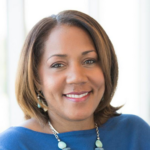Kimberly Barnes is the founder and CEO of ContentPark, a data-driven content agency. ContentPark’s “content heroes” understand that to develop high-performing marketing content, you need data. They test SEO best practices and data to craft better content. Kimberly Barnes leads a team of writers who develop content for clients.

What inspired you to start ContentPark?
I imagined a world where creatives could roam happily, unchained to a desk, completing work at a comfortable pace, getting paid what they are worth, and performing beyond their expectations free from undue pressures. Marketers would come to us for quality work crafted by quality writers. Companies would no longer suffer quality loss because they were stuck depending on just one quality freelancer—or, worse yet, a hodgepodge of overworked, underpaid content-mill workers. Making this imagined world a reality wasn’t easy to do. I discovered finding a good team is hard. Finding a great team is even harder. I understood the razor-fine line between deadline pressure and deadline paralyzes, so I set out to create an environment in which writers didn’t feel overly restricted or pressured in the creative process. I wanted to provide the flexibility most writers dream of having when they set off to become a writer, but often lose when they take on their first in-house writing role. I wanted to build a culture that truly valued that flexibility. I also wanted to prove that we could respect flexibility without compromising quality. By building a supremely competent, dedicated team, clients’ needs would be met while team members enjoyed the work-life balance they craved.
What is ContentPark’s mission, and how do you achieve it?
Our goal is to deliver high-quality, tailored content to our clients on time and on budget, every time. We strive to maintain greatness day in and day out. We are dedicated to continuous improvement. We take a hard look at our performance. We ask ourselves tough questions, then work together to find the answers. Our mission is a bit bigger than that, however. It’s for our name to be synonymous with unparalleled content strategy and development. Along the way, we’re redefining the ways people love to work and leaving the world a better plan than we found it.
What were the first logistical steps you took to start a business?
I started with observation. I was working full-time in marketing, which gave me an insider’s view and a great opportunity to mine for information. I paid close attention to what was going well—and what wasn’t—in the industry as a whole. I also made note of the things that frustrated marketers (and myself) in their day-to-day jobs. The most frequent complaint? A lack of access to quality writers. I wondered, “Were we alone in our frustration?” To find out, I spent hours talking to other marketers. I offered them sample writing free of charge to gauge their interest and get feedback. This step certainly wasn’t profitable, but it provided me with essential information for starting my own business. Finally, I pondered how I could differentiate our services from other content providers. And how could I communicate what made us different to potential customers? Sure, we’re writers. Sure, we write well…but the freelancer down the road could say the same thing. I’ve heard it said that as an entrepreneur you can be the first, you can be the best or you can be the cheapest. We obviously weren’t the first to produce content, and we certainly weren’t going to be the cheapest, so I needed to figure out how to make it clear that we were the best.
What is a day as Kimberly like? Please walk me through a day!
For the most part, I wake up when I want (unless I’ve got an unavoidable morning meeting). Being cheerful and chipper in the morning isn’t one of my superpowers, so I plan my day accordingly. I start the day tending to administrative tasks. By responding to emails, checking project progress, and completing some basic financial tasks in peace and quiet, I can avoid becoming over-stimulated. My real workday begins around noon. Generally, I take a shower right before lunch…unless I have yoga that day. After hunting and gathering something to eat, I get down to serious business. In the afternoon and evening, I take care of the business development tasks on my to-do for that particular day. Sometimes it’s marketing activities, such as managing a pay-per-click campaign or following up on leads. Other times it’s reaching out to clients.
I often end my day by writing emails. Because I don’t want to seem like a crazy 2 am-email-sender, I schedule them to go out around 7 or 8 am the same morning. By sending emails out at the top of everyone else’s day, I wake up to a healthy dose of emails waiting for my response—giving me just what I need to start another day.
Throughout the week, I pepper in networking events, seminars, and workshops. Because giving back to my community is important to me, I clock volunteer hours. Staying in shape is also a priority, so I work up a sweat in yoga, kickboxing, or any other activity that strikes my fancy several times a week.
What are your responsibilities as CEO of ContentPark?
At ContentPark, I wear a lot of hats…or, masks, really, as we call ourselves content heroes. You could reasonably say that I’m the CEO, CIO, CFO, CMO, and COO.
My primary responsibilities include:
- Managing team members
- Maintaining relationships with professional services
- Promoting business growth
- Handling project management
- Managing finances
- Facilitating business strategy development
- Asset management
What has been the proudest moment from your career so far?
Because I am keenly aware of what goes on behind the scenes at ContentPark—and how much work goes into each and every product we send to clients—I am at my proudest any time a client affirms our value. When a client expresses satisfaction, it proves that our people, our process, our product—everything, is working.
What have you learned about yourself since founding ContentPark?
I’ve learned that I don’t have to accept stress as an inevitability. I don’t like stress—neither do my employees, so I lead my business in a way that promotes peace. Maintaining zen is my goal. If someone or something interrupts our zen, we figure out how to change course to prevent future interruptions. I strive to remain calm so that I can create a sense of calm for the members of my team.
What has been the biggest challenge and, on the flip side, the biggest reward of starting ContentPark?
Our biggest challenge is finding the right people to be on our team. Not everyone is a content hero. While some people realize they aren’t content hero material, others put on a mask and pretend they have the right stuff. Telling the difference between true heroes and mask wearers is hard work. No matter what questions we ask or which tests we assess, it’s difficult to determine how talented a candidate really is, how willing he or she is to get their hands dirty, and how well he or she will integrate with a team…until the candidate is actually on the team. We also face a special challenge because so much of our work is remote. Our content heroes must be honest, capable, and self-managing. Sometimes those qualities can be difficult to assess from afar adequately. Because finding the right team members is so challenging when I do find the perfect fit for our team, it’s exceptionally rewarding. Building our squad has taken effort—and will continue to require attention—but I count our exceptional people as my greatest reward.
What is the most important characteristic for entrepreneurs to have?
Resilience. Today might be great, but tomorrow might suck. And it might not just be tomorrow that sucks. You might have to deal with a sustained period of suckiness for three weeks before you have another great day. To be successful as an entrepreneur, you have to learn to manage your insecurities (because we all have them) and your mood as you deal with periods of discomfort or momentary struggle.
Keeping a positive outlook can be difficult when you associate your value with the business you’re building. You are not your business. Your business’s failures are not your failures. If you can’t keep this distinction, you’re bound to struggle.
What is one thing that you wish you had known when you were starting out your career?
If I could tell fresh-out-of-college me one thing, it would be, “You won’t do the same thing for your entire life.” Often, we’re made to feel that whatever career we choose, we’ll be stuck with forever. The idea of being forever pigeon-holed or making the “wrong” choice can be overwhelming. I have a diverse collection of professional experiences. Some I’ve enjoyed more than others, but I don’t regret any of them. They’ve all, in one way or another, led me to where I am today. I just wish that when I’d started, I’d known that a career is a journey, not a destination.
What is on your desk right now?
My desk contains the basics…
- Cell phone
- Laptop
- Book
- Water
- Pen
- Business cards
- Orchid
What are your three favorite books?
- “Leading in Black and White: Working Across the Racial Divide” By Ancella B. Livers Keith A. Caver
- “The 4-Hour Workweek: Escape 9-5, Live Anywhere, and Join the New Rich” By Timothy Ferriss
- “Fierce Conversations: Achieving Success at Work and in Life One Conversation at a Time” By Susan Scott
What is your morning routine?
I can’t reiterate this enough—I’m not a “morning person.” I know that mornings and I don’t get along, and I’ve learned to accommodate by planning my day accordingly.
I start my day in silence—except for the tap of my laptop keys and the occasional click of my mouse. A quiet start prevents me from becoming overwhelmed in the morning, which can impact my mood for the rest of the day. Because seriously, who wants to start the day stressed?
What is the best advice you’ve ever received?
The best advice I ever received was, “You can’t conquer the world in one day.” This seemingly simple piece of advice was transformative for young me. At the time, I was impatient. I knew what I wanted, and I didn’t want it later, I wanted it right then. In retrospect, I viewed having to wait as an indication that I had failed or was in some way incapable. I didn’t understand that there’s a difference between the lives that people portray—on social media and the like—and the lives they actually live. I just assumed that everyone—minus me—had it all together. Ultimately, this piece of advice resonated with me because it relieved some of the pressure I was putting on myself.
What are you reading right now?
“Blindspot: Hidden Bias’ in Good People” by Mahzarin R. Banaji by Anthony G. Greenwald
What is your career advice for other young professional women?
Get to know yourself. It sounds cliche, but keep reading. For many young girls, growing up means spending a lot of time trying to become someone. Then when we’ve achieved what we think we want, we’re still not content. In many cases, what we’ve worked so hard to achieve isn’t fulfilling because it doesn’t feed the deepest parts of our being. The result: we’re misaligned with ourselves. So instead of trying to” become someone,” spend your time discovering the person you already are…that is, find out what drives you, what motivates you, what pains you, what brings you life. Remember: No “thing” can generate happiness. No goal met or accomplishment checked off the list can provide true fulfillment. Happiness, satisfaction, and contentment are found within, which makes understanding yourself a step you can’t skip or take lightly. Prioritize the who that you are as a guide to determine the “what” that you do…for your career and beyond. By doing so, you’ll begin to bring yourself into alignment—the foundation for a happy and fulfilled life.































